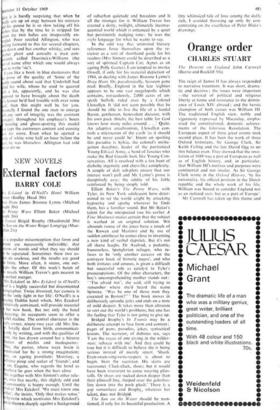NEW NOVELS
External factors
BARRY COLE
rs Eckdorf in O'Neill's Hotel William vor (Bodley Head 30s) rag Hunt James Broome Lynne (Michael ph 30s) e Penny Wars Elliott Baker (Michael ph 30s) Transit Brigid Brophy (Macdonald 30s) e Sun on the Water Roger Longrigg (Mac- Ian 21s) rt a popular misconception that form and tent are necessarily indivisible; that terns of words and what they say should t be separated. Sometimes these two as- is do coalesce, and the results- are good d finite. More often, it seems, one out- ighs the other. Of this week's batch of
o novels William Trevor's gets nearest to
• perfect merger.
Mrs Eckdorf in Mrs Eckdorf in O'Neill's tel is a highly successful but discontented otographer. Twice divorced, her camera is w the `only light in her life'. O'Neill's is a aying Dublin hotel which, Mrs Eckdorf tuitively convinced, will provide material her new book. But not only the hotel decaying; its occupants seem to offer a mile! decline. The central character is the el's owner, ninety-two year old Mrs Sin- t. Totally deaf from birth, communicat- only by writing, and with the qualities of
• int, she has drawn around her a bizarre lection of misfits and inadequates: hea, the porter, whose weak brain is pensated for by a strong imagination; s, an ageing prostitute; Morrisey, a all-time pimp and seeker of 'friends', and son, Eugene, who regards the hotel as ewhere he goes when the bars close • ut, together with Mrs Sinnott's other rela- s, who live nearby, this slightly odd and I community is happy enough. Until the 'al ot Mrs Eckdorf. 'We must know one her', she insists. 'Only that makes sense.' hysteria which motivates Mrs Eckdorf's Is thrown sharply against a background of suburban quietude and boredom and is all the stronger for it. William Trevor has created a dotty, twilight, ultimately inconse- quential world which is enhanced by a quiet but persistently nudging tone: he uses the right language for what he wants to say.
In the odd way that uninvited literary references force themselves upon the re- viewer as a sort of shorthand guide for his readers (Mrs Sinnott could be described as a sort of spiritual Captain Cat; Agnes as an ageing Polly Garter), I am tempted to invoke Orwell, if only for his material depiction of 1984, in dealing with James Broome Lynne's Drag Hunt. Or, paradoxically, Sassoon gone mad. Briefly, England in the late 'eighties appears to be one vast megalopolis which contains, miraculously, 2,000 acres of un- spoilt Suffolk ruled over by a Colonel Llewellyn. It 'did not seem possible that he should be able to live the life of a feudal Baron, gentleman, benevolent dictator, with his own pack (bitch), the best table for God knows how many miles around. . . .9 Quite. An adaptive anachronism, Llewellyn con- trols a microcosm of the earth 'as it should be and never could be'. Intent on spoiling this paradise is Sylvia, the colonel's misbe- gotten daughter, leader of the puritanical Young Ethical Army, a band of fanatics who make the Red Guards look like Young Con- servatives. All is resolved with a fox hunt of diabolic ingenuity and chess-like complexity. A couple of deft sub-plots ensure that our interest won't pall and Mr Lynne's prose is deceptively easy; the oddity of his fable reinforced by being simply told.
Elliott Baker's The Penny Wars, with Tyler, its New York adolescent hero deter- mined to set the world aright by attacking hypocrisy and apathy wherever he finds them, has a familiar sound. But Mr Baker's talent for the unexpected (see his earlier A Fine Madness) makes certain that the subject is washed in an original solution. Wit abounds (some of the jokes have a touch of the Rowan and Martins) and by use of sudden antitheses he comes close to inventing a new kind of verbal slapstick. But it's not all sleeve laughs. Dr Axelrod, a pedantic, humourless, Spenglerian refugee, who re- fuses to be 'only another carcass on the conveyor hook of historic recess', and who both irritates and amuses, is given a difficult but successful role as catalyst to Tyler's preoccupations. Of the other characters, the boy's uncomprehending mother stands out : "I'm afraid not", she said, still trying to remember where she'd heard the name Spinoza. "Was he one of those men they executed in Boston?"' The book moves in deliberately episodic jerks and ends on a note of mild despair. It takes more than altruism to sort out the world's problems, but one has the feeling that Tyler is not going to give up.
Bridgid Brophy's In Transit may be a deliberate attempt to fuse form and content : pages of puns, parodies, jokes, syntactical lesions. The narrator, of dubious sex, says 'I am the voyce of one crying in the wilder- ness; reJoyce with me'. And that could be true but it is difficult to believe she is being serious instead of merely smart. 'Shush. Even-swan-song-vesta-vespers is about to begin. Skirt the sacristan. His skirts are sacrosanct. Clack-clack, shoes; but it would have been irreverent to come wearing plim- solls. Or shoes are sucked down deeper than their plimsoll line, slurped over the goloshes- line down into the posh plush.' There is a gap somewhere and Brophy, whatever her talent, does not Bridgid.
The Sun on the Water should be men- tioned, if only for its beautiful production. A
tiny whimsical tale of love among the daffy rich, I avoided throwing up only by con- centrating on the excellence of Peter Blake's drawings.










































 Previous page
Previous page